One, True Occupational Ladder? – Work in Progress
How do Americans really view the occupational hierarchy? A new article by Freda B. Lynn, Yongren Shi, and Kevin Kiley (@kkiley.bsky.social) finds less agreement on the status of occupations than estimates suggest. Read more on the Work In Progress blog:
29.08.2025 21:52 — 👍 2 🔁 2 💬 0 📌 0
 26.08.2025 01:28 — 👍 1 🔁 0 💬 1 📌 0
26.08.2025 01:28 — 👍 1 🔁 0 💬 1 📌 0
Great work by some great thinkers. Excited to see it in @sociologicalsci.bsky.social of all places.
14.08.2025 20:06 — 👍 9 🔁 2 💬 1 📌 0
Intentionally mis-formatting em dashes as "--" to let people know I'm a human.
07.07.2025 16:08 — 👍 3 🔁 0 💬 0 📌 0
I'm a sociology professor from North Carolina, not a congressional representative from California. Representative Kiley is not on BlueSky.
03.07.2025 18:04 — 👍 1 🔁 0 💬 0 📌 0
I am not a representative from California. I'm a professor from North Carolina. Rep. Kevin Kiley is not on BlueSky, as far as I know.
01.07.2025 18:50 — 👍 0 🔁 0 💬 1 📌 0
EVERY time?
27.06.2025 16:14 — 👍 0 🔁 0 💬 0 📌 0
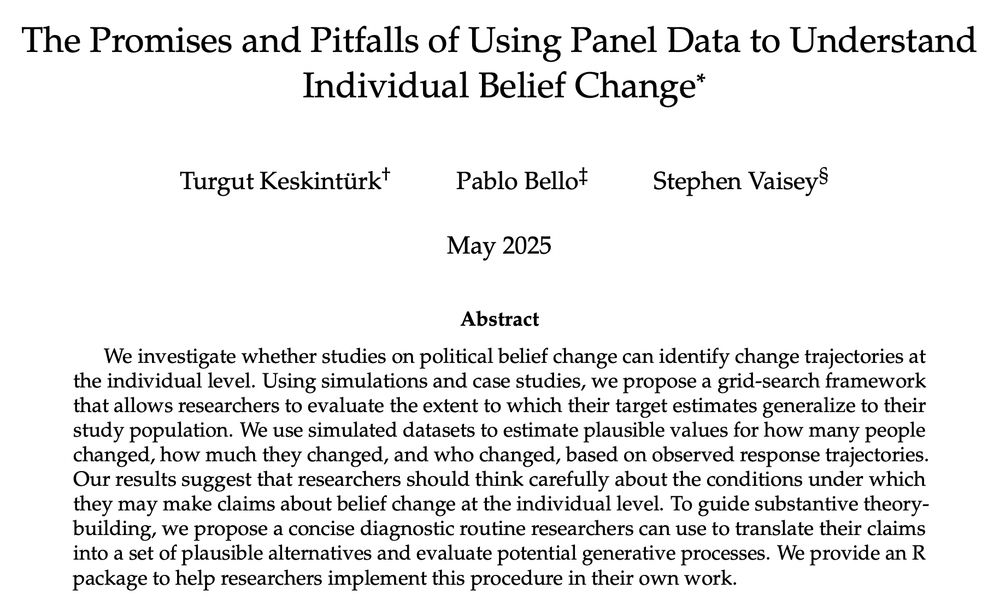
a new article in Political Psychology: osf.io/rhf4q
we argue that studies of belief change have an identifiability problem much like the APC problem: the composition of change (who changed or how much they changed) is observationally confounded.
with @pablobellode.bsky.social & @stephenvaisey.com:
24.06.2025 09:07 — 👍 55 🔁 16 💬 4 📌 0
Check out my new article on xenophobic and Islamophobic rhetoric among US evangelical leaders that just got published (open access) in @sociusjournal.bsky.social
journals.sagepub.com/doi/10.1177/...
13.06.2025 16:21 — 👍 4 🔁 2 💬 2 📌 0
A great part of sociology is that you read a bunch of books about completely different topics (Marriage! Naval navigation! Churches!) that are secretly about the same thing, and then you read a bunch of books that are just called “Social Theory” that are completely unrelated to each other.
10.06.2025 18:16 — 👍 3 🔁 0 💬 0 📌 0

a snippet from the post, saying:
"Critiques like this, mostly coming from the Heterodox Academy quarters of academia, share a familiar structure. They contend that sociology is “politically captured,” yet when it is time to say what scholars should actually do differently, the prescriptions are procedural (new review boards, special grants, and viewpoint-diversity pledges), rather than intellectual."
a "heterodox" critique of sociology is just a critique in search of its orthodoxy. in this short post, I argue that criticism of sociology should be substantive, with *actual* implications for practice.
Criticism of Sociological Orthodoxy Needs to be Substantive
tkeskinturk.github.io/blog/orthodoxy
09.06.2025 23:16 — 👍 11 🔁 4 💬 1 📌 1
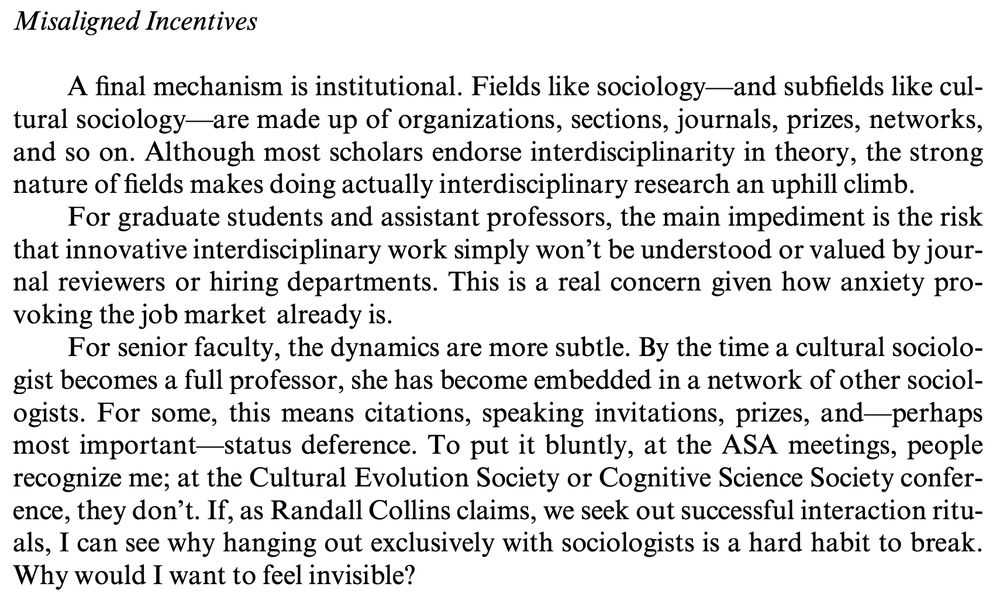
Misaligned Incentives. A final mechanism is institutional. Fields like sociology—and subfields like cultural sociology—are made up of organizations, sections, journals, prizes, networks, and so on. Although most scholars endorse interdisciplinarity in theory, the strong nature of fields makes doing actually interdisciplinary research an uphill climb. For graduate students and assistant professors, the main impediment is the risk that innovative interdisciplinary work simply won’t be understood or valued by journal reviewers or hiring departments. This is a real concern given how anxiety provoking the job market already is. For senior faculty, the dynamics are more subtle. By the time a cultural sociologist becomes a full professor, she has become embedded in a network of other sociologists. For some, this means citations, speaking invitations, prizes, and—perhaps most important—status deference. To put it bluntly, at the ASA meetings, people recognize me; at the Cultural Evolution Society or Cognitive Science Society conference, they don’t. If, as Randall Collins claims, we seek out successful interaction rituals, I can see why hanging out exclusively with sociologists is a hard habit to break. Why would I want to feel invisible?
I just happened to read @stephenvaisey.com on this www.jstor.org/stable/48642...
03.06.2025 22:59 — 👍 22 🔁 5 💬 2 📌 0
I am a professor from North Carolina, not a U.S. congressional representative from California. I don't believe that Kevin Kiley is on bluesky.
30.05.2025 16:59 — 👍 0 🔁 0 💬 1 📌 0
Stop micro-blogging and start meso-blogging.
05.05.2025 16:57 — 👍 1 🔁 0 💬 0 📌 0
Be the change you want to see in the world! Get a few good buddies and start a blog!
05.05.2025 16:56 — 👍 0 🔁 0 💬 1 📌 0
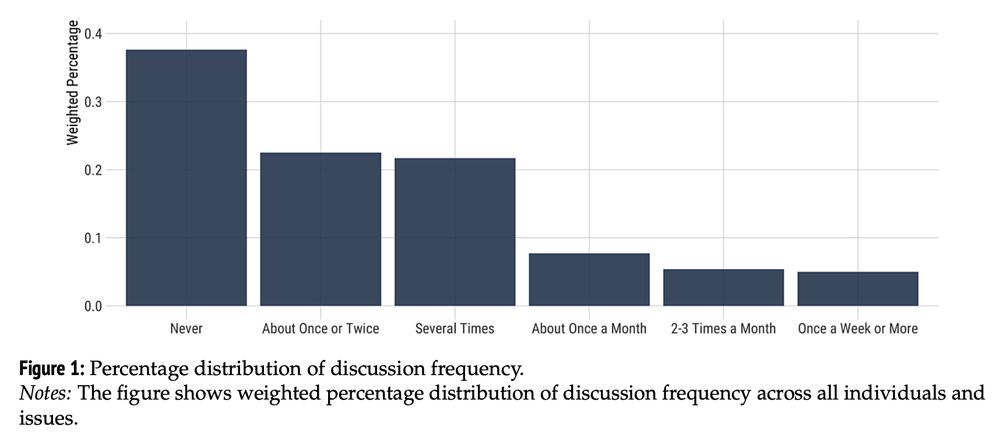
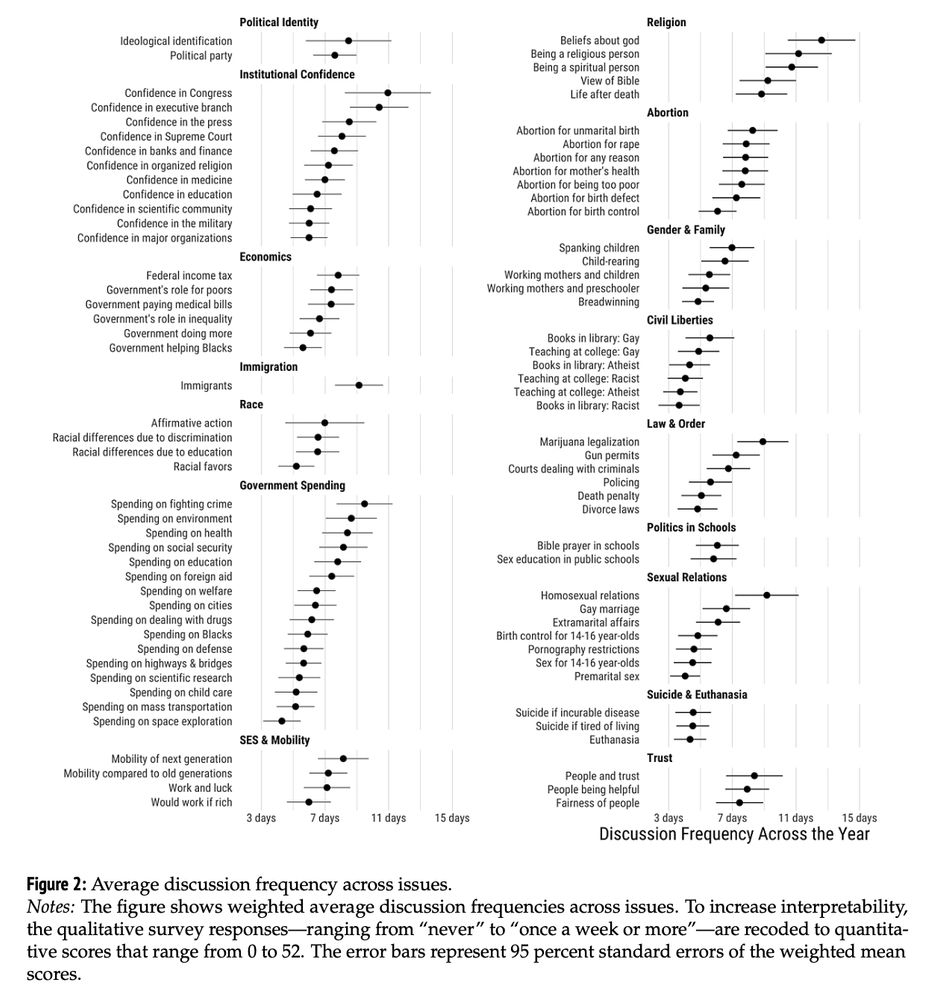
They say this stuff came up "never" or "about once or twice" in past year, but there was substantial difference across topics. Most common topics were related to religion, immigration, and general sentiment toward politicians (we fielded the survey in summer 2024).
05.05.2025 13:41 — 👍 1 🔁 0 💬 0 📌 0

What Are You Talking about? Discussion Frequency of Issues Captured in Common Survey Questions
Article: What Are You Talking about? Discussion Frequency of Issues Captured in Common Survey Questions | Sociological Science | Posted May 2, 2025
Ever wonder how often the public talks about issues that come up in social science surveys? We asked people how many times in past year they talked about topics of 88 GSS questions, including issues in politics, religion, & morality (short answer: rarely): sociologicalscience.com/articles-v12...
05.05.2025 13:33 — 👍 6 🔁 1 💬 2 📌 0
Hot off the presses! I would say go talk about it with your friends, but everything we find leads us to expect that you won't.
03.05.2025 11:28 — 👍 10 🔁 3 💬 0 📌 0
OSF
While you wait to the PDF link to get fixed, you can always read the preprint: osf.io/preprints/so...
03.05.2025 01:46 — 👍 0 🔁 0 💬 0 📌 1
Hey friends, I’m job hunting!
Looking for roles in data science or research—if you hear of anything, I’d love it if you send it my way.
If you’re looking for someone who knows Python, R, Stan, has collected and worked with all kinds of data, and is always excited to learn more—let’s talk! 😊
22.04.2025 22:52 — 👍 4 🔁 3 💬 1 📌 0
Cc @tkeskinturk.bsky.social
28.03.2025 20:43 — 👍 0 🔁 0 💬 0 📌 0
New study coming in @sociologicalsci.bsky.social. We asked Americans which topics from the GSS they spend time talking about. Generally, people say they talk about these issues "never" (~40%) or "once or twice in the past year." Religious topics much more common than most political, "social" issues.
27.03.2025 15:39 — 👍 10 🔁 3 💬 1 📌 0
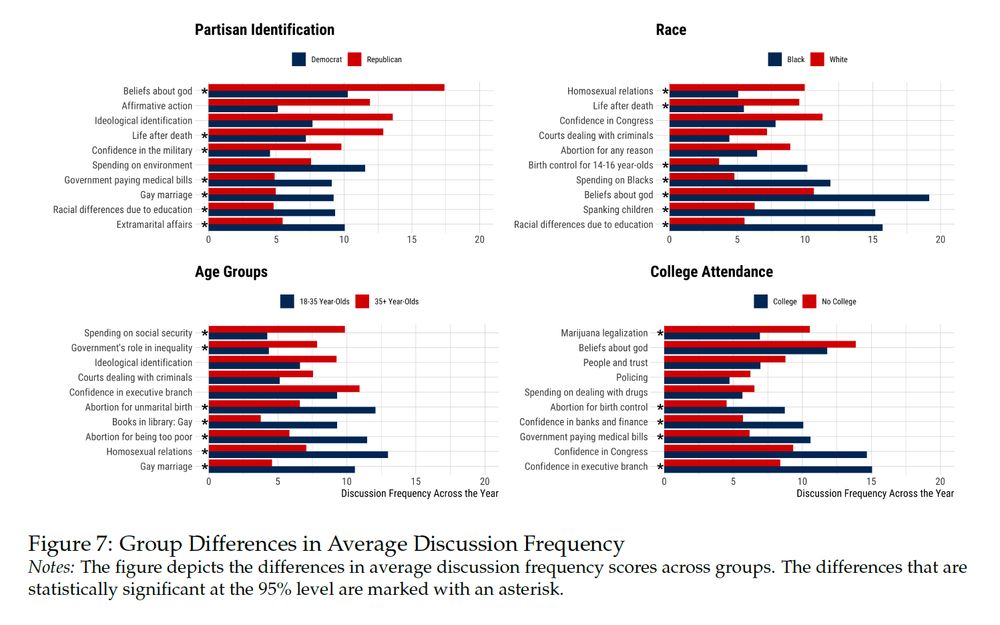
Some notable difference across groups: Republicans say they talk more about religion. Democrats say they talk more about extramarital affairs (!). Older respondents say they talk more about social security. Younger respondents say they talk more about homosexuality and gay marriage.
27.03.2025 15:45 — 👍 1 🔁 0 💬 1 📌 0
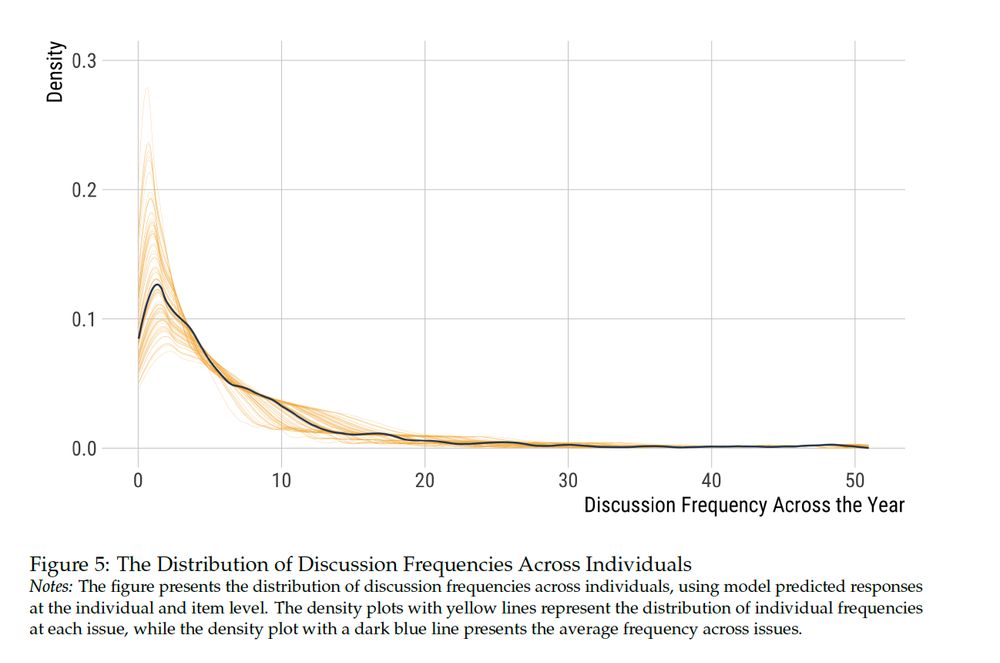
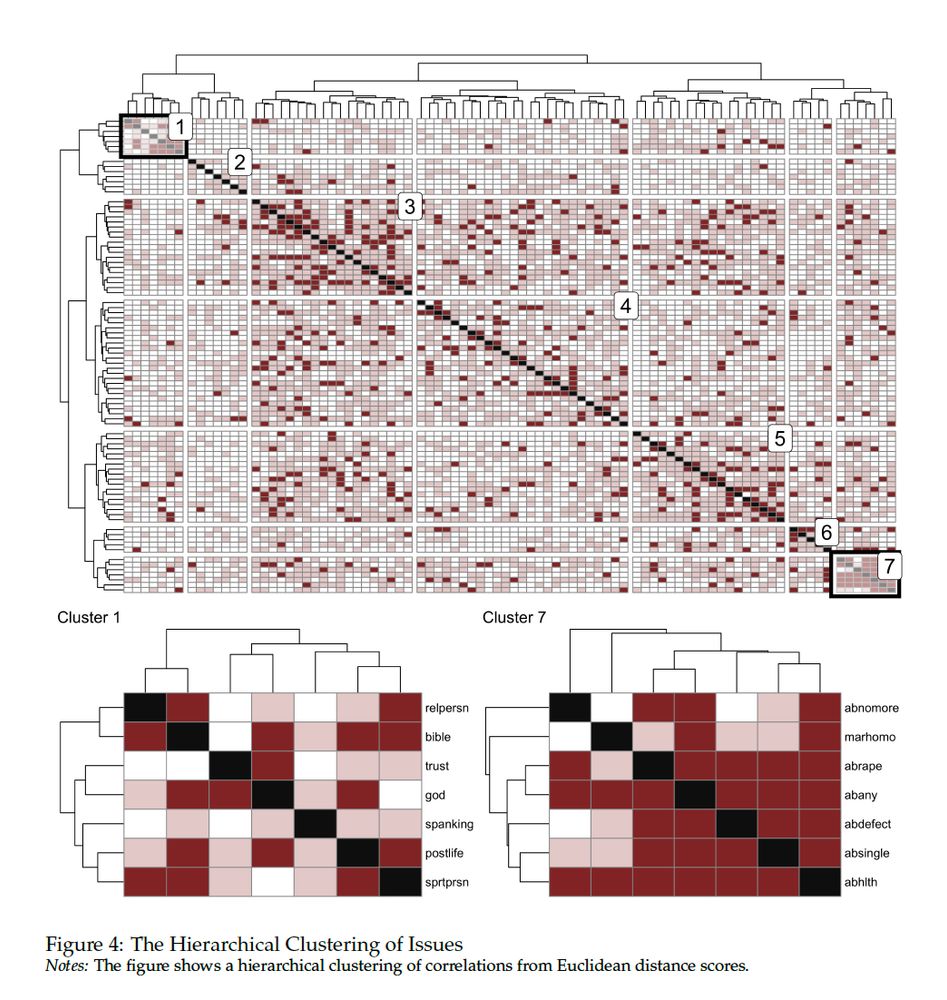
Average reported discussion frequency of each issue highly skewed by a few people who talk a lot about most things -- your friends who are always talking about politics. People who say they talk a lot about one thing likely to say they talk more about everything else, too.
27.03.2025 15:42 — 👍 0 🔁 0 💬 1 📌 0
New study coming in @sociologicalsci.bsky.social. We asked Americans which topics from the GSS they spend time talking about. Generally, people say they talk about these issues "never" (~40%) or "once or twice in the past year." Religious topics much more common than most political, "social" issues.
27.03.2025 15:39 — 👍 10 🔁 3 💬 1 📌 0
I'm not a congressional representative from California. I'm a professor in North Carolina.
19.03.2025 19:39 — 👍 1 🔁 0 💬 1 📌 0
I'm not a congressional representative from California. I'm a professor in North Carolina.
19.03.2025 19:39 — 👍 0 🔁 0 💬 1 📌 0
Sage Journals: Discover world-class research
Subscription and open access journals from Sage, the world's leading independent academic publisher.
Excited about a new article with Reilly Kincaid in ASR @asanews.bsky.social on role-accumulation & mental health across the life course. We identify a disagreement across prominent theories for how role-accumulation should affect mental health, especially in older adulthood. doi.org/10.1177/0003...
03.02.2025 15:06 — 👍 17 🔁 5 💬 2 📌 0
Blog of the American Sociological Association; sociology on the economy, work and inequality.
wipsociology.org
Professor, University of California, Riverside School of Public Policy. Faculty Director, Science to Policy (S2P). Public health scientist & sociologist keen on population health & community issues. Sometimes in the news, often for troubling topics. 🇺🇸 🇨🇦
Sociologist @sc.edu. I study how organizations and networks shape behavior, culture, and inequality.
https://demc-lab.github.io/
Professor | Books: Growing God's Family; Addicted to Lust; Taking America Back for God; The Flag and The Cross; Religion for Realists | CV: https://tinyurl.com/4hs86ntn
Pronounced Gyoo-in, Assoc Prof
@SociologyUCLA. Religion/Schools/Theory, he/él/هو, Dad to 2, Book 2: Against Achievement: What Meritocracy (and Social Science) Misses About Schools
Professor of Sociology, Princeton, www.princeton.edu/~mjs3
Author of Bit by Bit: Social Research in the Digital Age, bitbybitbook.com
Professor of Sociology at Ludwig-Maximilians-Universität München (LMU Munich) & Founding Director of the Munich International Stone Center for Inequality Research (ISI)
Inequality, mobility, wealth, education.
www.fabianpfeffer.com
www.isi-munich.de
Demography nerd at Pew Research Center
Global religious change, sociology
Public policy professor, Price School USC @priceschool.usc.edu, father, poverty/social policy/racial inequality/immigration/policymakers, posts do not speak for employer, https://bradydave.wordpress.com
Sociologist & professor who studies youth suicide, schools, medicine & her cats. Co-Author: Life under Pressure: The Social Roots of Youth Suicide & What to Do About Them. Swellesley Alum. Views my own.
Social scientist | Author of #SomeoneToTalkTo, #PersonalNetworks, #QualitativeLiteracy | Networks. Inequality. Methods | PTY native | Posts occasionally.
Sociology Assistant Professor @University of Georgia
Social networks, migration, inequality, computational and statistical methods
www.penghuang.me
Institute for Social Research (ISR) — a global leader in social science.
Exploring politics, health, inequality, and more at the University of Michigan.
Sociologist, teacher, author (with Chris Takacs) of How College Works; also books on swimming, nursing, research methods, and article "Mundanity of Excellence" (performance theory).
Oxford Sociology PhD | political sociology | carbs and books are my religion
www.giacomomelli.com
Professor, Harris School of Public Policy, Director, Stone Center for Research on Wealth Inequality and Mobility, University of Chicago
Assistant Professor of Sociology at UNC-Chapel Hill. Research on cities, housing, markets, racism, and resistance.
Sociologist at the University of Georgia. Social psychology, sociology of emotion, group processes, social networks.
Sociologist at @gesis.org working with EU-SILC in @fdzgml.bsky.social. Research interests: econometrics, survey methodology, sociology of wealth, family sociology, integration/migration, ethnic segregation. Typos galore🌻🏴🚩
The Institute for Analytical Sociology (IAS) at Linköping University conducts big-data influenced research on important social, political, and cultural matters.
https://liu.se/en/organisation/liu/iei/ias
 26.08.2025 01:28 — 👍 1 🔁 0 💬 1 📌 0
26.08.2025 01:28 — 👍 1 🔁 0 💬 1 📌 0








